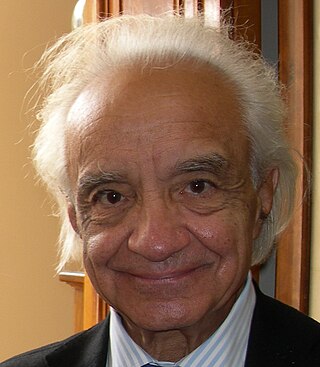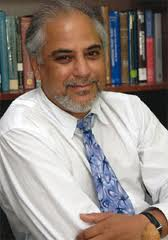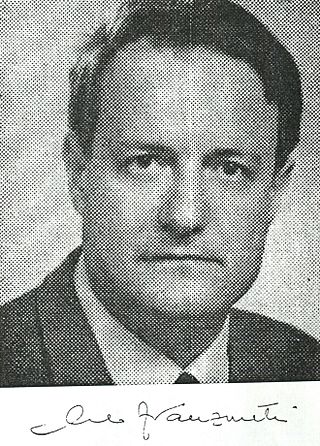
The European Organization for Nuclear Research, known as CERN, is an intergovernmental organization that operates the largest particle physics laboratory in the world. Established in 1954, it is based in Meyrin, western suburb of Geneva, on the France–Switzerland border. It comprises 24 member states. Israel, admitted in 2013, is the only non-European full member. CERN is an official United Nations General Assembly observer.

Carlo Rubbia is an Italian particle physicist and inventor who shared the Nobel Prize in Physics in 1984 with Simon van der Meer for work leading to the discovery of the W and Z particles at CERN.

TRIUMF is Canada's national particle accelerator centre. It is considered Canada's premier physics laboratory, and consistently regarded as one of the world's leading subatomic physics research centres. Owned and operated by a consortium of universities, it is on the south campus of one of its founding members, the University of British Columbia in Vancouver, British Columbia, Canada. It houses the world's largest normal conducting cyclotron, a source of 520 MeV protons, which was named an IEEE Milestone in 2010. Its accelerator-focused activities involve particle physics, nuclear physics, nuclear medicine, materials science, and detector and accelerator development.

King Abdulaziz City for Science and Technology in Riyadh, Saudi Arabia is a governmental organization established in 1977 as the Saudi Arabian National Center for Science & Technology (SANCST); in 1985, it was renamed King Abdulaziz City for Science and Technology.

The Bhabha Atomic Research Centre (BARC) is India's premier nuclear research facility, headquartered in Trombay, Mumbai, Maharashtra, India. It was founded by Homi Jehangir Bhabha as the Atomic Energy Establishment, Trombay (AEET) in January 1954 as a multidisciplinary research program essential for India's nuclear program. It operates under the Department of Atomic Energy (DAE), which is directly overseen by the Prime Minister of India.

Antonino Zichichi is an Italian physicist who has worked in the field of nuclear physics. He has served as President of the World Federation of Scientists and as a professor at the University of Bologna.

Edoardo Amaldi was an Italian physicist. He coined the term "neutrino" in conversations with Enrico Fermi distinguishing it from the heavier "neutron". He has been described as "one of the leading nuclear physicists of the twentieth century." He was involved in the anti-nuclear peace movement.

Luciano Maiani is a Sammarinese physicist best known for his prediction of the charm quark with Sheldon Glashow and John Iliopoulos.

Swapan Chattopadhyay CorrFRSE is an Indian American physicist. Chattopadhyay completed his PhD from the University of California (Berkeley) in 1982.

The National Centre for Physics is a federally funded research institute and national laboratory co-located near Quaid-i-Azam University in Pakistan
The Sarayköy Nuclear Research and Training Center, known as SANAEM, is a nuclear research and training center of Turkey. The organization was established on July 1, 2005, as a subunit of Turkish Atomic Energy Administration at Kazan district in northwest of Ankara on an area of 42.3 ha.

The Antiproton Accumulator (AA) was an infrastructure connected to the Proton–Antiproton Collider – a modification of the Super Proton Synchrotron (SPS) – at CERN. The AA was built in 1979 and 1980, for the production and accumulation of antiprotons. In the SppS the antiprotons were made to collide with protons, achieving collisions at a center of mass energy of app. 540 GeV. Several experiments recorded data from the collisions, most notably the UA1 and UA2 experiment, where the W and Z bosons were discovered in 1983.

Carlo Franzinetti was an Italian experimental physicist.
Advanced Accelerator Applications is a France-based pharmaceutical group, specialized in the field of nuclear medicine. The group operates in all three segments of nuclear medicine to diagnose and treat serious conditions in the fields of oncology, neurology, cardiology, infectious and inflammatory diseases.

Valangiman Subramanian Ramamurthy is an Indian nuclear physicist with a broad range of contributions from basic research to Science and Engineering administration.Prof.Ramamurthy started his career in Bhabha Atomic Research Centre, Mumbai in the year 1963. He made important research contributions in the area of nuclear fission, medium energy heavy ion reactions, statistical and thermodynamic properties of nuclei and low energy accelerator applications. During the period 1995-2006, Prof.Ramamurthy was fully involved in Science administration as Secretary to Government of India, Department of Science and Technology, (DST), New Delhi.Other important assignments held by him include Director, Institute of Physics, Bhubaneswar, (1989-1995), DAE Homi Bhabha Chair in the Inter-University Accelerator Centre, New Delhi (2006-2010), and Director of the National Institute of Advanced Studies, Bengaluru (2009-2014). He is a former chairman of the Recruitment and Assessment Board of the Council of Scientific and Industrial Research and has served as a member of the design team of the first Indian nuclear experiment in Pokhran on 18 May 1974. The Government of India awarded him the third highest Indian civilian honour of Padma Bhushan in 2005.
Dilip Devidas Bhawalkar is an Indian optical physicist and the founder director of the Raja Ramanna Centre for Advanced Technology (CAT), an institute under the Department of Atomic Energy, serving as a centre for higher studies in the fields of lasers and particle accelerators. He is credited with pioneering research in optics and lasers in India and is reported to have contributed in making CAT a partner in the International Linear Collider and Large Hadron Collider experiments of the European Organization for Nuclear Research (CERN). He is a recipient of the Shanti Swarup Bhatnagar Prize, the highest Indian award in science and technology. The Government of India awarded him the fourth highest civilian award of the Padma Shri in 2000.

Giorgio Salvini was an Italian physicist and politician.
The Laboratori Nazionali di Legnaro is one of the four major research centers of the Italian National Institute for Nuclear Physics (INFN). The primary focus of research at this laboratory is in the fields of nuclear physics and nuclear astrophysics, where five accelerators are currently used. It is one of the most important facilities in Italy for research in these fields. The main future project of the laboratory is the Selective Production of Exotic Species (SPES), in which various radionuclides will be produced for research and medicinal purposes.
Luisa Cifarelli FInstP is a Professor of Experimental Particle Physics at the University of Bologna. She is the Director of the La Rivista del Nuovo Cimento.

CERN-MEDical Isotopes Collected from ISOLDE (MEDICIS) is a facility located in the Isotope Separator Online DEvice (ISOLDE) facility at CERN, designed to produce high-purity isotopes for developing the practice of patient diagnosis and treatment. The facility was initiated in 2010, with its first radioisotopes (terbium-155) produced on 12 December 2017.















